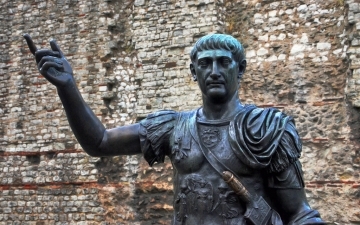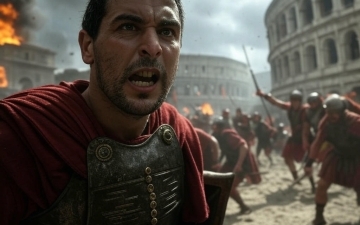The Challenges and Blessings of Being a Christian in Modern Times

Christianity, born in a time of Roman rule and cultural upheaval, has always thrived amid paradox: power through humility, victory through suffering, life through death. In modern times—marked by rapid technological advancement, shifting moral landscapes, and growing religious pluralism—being a Christian is both profoundly challenging and richly rewarding. It calls for wisdom, discernment, and an unwavering commitment to Christ in a world that increasingly questions absolute truths.
I. A Faith Built on a Paradox
From its inception, Christianity has been deeply intertwined with symbols of transformation and rebirth. Among the most potent is the Jordan River, where Jesus Himself was baptized by John, initiating His public ministry. For Christians throughout history, the Jordan has come to represent the movement from old to new, from bondage to freedom, from death to life. Today, these same themes echo powerfully in the life of the modern believer.
The Jordan River is more than a body of water; it is a spiritual metaphor. The river’s significance speaks to the soul’s crossing over from spiritual death into newness of life. This theme of resurrection and change continues to inspire believers today. To explore the layers of meaning, visit this in-depth look at the jordan river meaning death, the jordan river symbolism, and the jordan river significance.
II. The Modern Landscape of Faith
1. Secularism and the Decline of Institutional Religion
One of the major challenges facing Christianity today is the rise of secularism. In many Western nations, traditional Christian institutions have lost social authority. Church attendance is down, moral relativism is up, and belief in absolute truth is often met with skepticism or outright hostility. In such an environment, faith becomes countercultural.
This shift has forced Christians to re-evaluate how they live out their beliefs. The challenge is no longer just about proclaiming the Gospel—it’s about living it out in ways that are both faithful and relevant. Authenticity, not just orthodoxy, has become the currency of Christian witness.
2. The Digital Dilemma
The digital age brings both blessing and burden. On one hand, the Gospel is more accessible than ever before. Sermons, Scripture apps, worship music, and theological content are just a click away. On the other hand, the constant stream of digital noise often leads to spiritual numbness. Social media has cultivated a culture of comparison, outrage, and distraction, all of which hinder deep spiritual formation.
Being a Christian in this context requires intentional discipline: unplugging regularly, prioritizing solitude and prayer, and distinguishing the voice of God from the digital cacophony.
III. Blessings Hidden in the Struggle
Despite the headwinds, modern Christians experience blessings unique to this age.
1. Global Connection
Never before in history have believers been so interconnected. Christians from every continent now worship together online, pray for one another across time zones, and engage in joint missions through virtual platforms. This has fostered a more global understanding of the Body of Christ.
Persecuted believers can now receive support and solidarity from brothers and sisters thousands of miles away. The early Church never imagined such possibilities—but perhaps they prayed for them.
2. Renewed Focus on Discipleship
The cultural decline of “nominal Christianity” has made it clear: following Jesus is not a passive identity—it’s an active calling. As societal pressures grow, so does the hunger for deep discipleship. More Christians are turning to spiritual disciplines, theological training, and intentional community life. Small groups, house churches, and discipleship networks are rising in response.
This return to the roots—a commitment to Christ, Scripture, prayer, and service—echoes the early Church’s vitality. What seems like a loss in numbers may actually be a gain in depth.
3. Opportunities for Redemptive Engagement
Cultural crises—whether related to race, justice, sexuality, or politics—have opened new doors for Christians to demonstrate Christ-like compassion and clarity. The world is watching closely, not just for what Christians believe, but for how they love.
Believers in 2025 are learning to live redemptively in tension. They are refusing both legalism and license, and instead choosing the narrow way of grace and truth.
IV. Faith Under Fire: Persecution and Conviction
While many in the West face social alienation for their beliefs, Christians in other parts of the world face arrest, violence, or even martyrdom. According to recent reports, Christian persecution remains severe in over 50 countries.
Yet persecution has a strange way of sharpening faith. Churches in hostile environments often report exponential growth, unshakable unity, and an intense reliance on God. This paradox is yet another reminder that what appears to be a curse is often a hidden blessing in the economy of God.
V. What It Takes to Stand Today
Being a Christian in modern times takes more than nominal belief—it demands deep conviction, daily courage, and unwavering hope. It means:
- Praying when others are panicking.
- Forgiving when others are retaliating.
- Giving when others are hoarding.
- Believing when others are deconstructing.
And above all, it means remembering that this world is not our final home.
Just as the Israelites crossed the Jordan River into the Promised Land—leaving the wilderness behind—modern Christians are called to cross over from fear to faith, from isolation to community, from cultural conformity to divine calling. The symbolic message of the Jordan is more relevant than ever: each believer must choose daily to move from death to life, from old ways to new creation.
To reflect more deeply, explore these linked insights on the jordan river meaning death, jordan river symbolism, and jordan river significance.
Light in the Shadows
The Christian life has never been easy. It was never meant to be. But modern challenges are matched by modern graces. In an age of doubt, believers are called to be lights. In a culture of confusion, they are called to be salt. And in a world of despair, they are called to hope.
As long as the river still flows, there will be new crossings—new moments of decision, transformation, and grace. The Jordan’s symbolic journey is not over. It continues in the lives of millions who, despite the odds, still choose Christ each day.
Related Posts
The Challenges and Blessings of Being a Christian in Modern Times
Christianity, born in a time of Roman rule and cultural upheaval, has always thrived amid paradox: power through humility, victory through suffering, life through death. In modern times—marked by rapid technological advancement, shifting moral landscapes, and growing religious pluralism—being a Christian is both profoundly challenging and richly rewarding. It calls...
Read MoreCareer Guide: Construction Managers – Building Careers in the Built Environment
Construction managers are the masterminds behind the successful delivery of building and infrastructure projects. They ensure that every phase of construction — from initial design planning to the final handover — is carried out efficiently, safely, and in compliance with all regulations. As pivotal leaders in the construction sector, they...
Read MoreOrganizing Archival Gear for Museums and Collectors
Proper archival care of equipment is necessary for collectors and museums to conserve valuable artifacts and records. Proper categorization, storage, and environmental control help maintain collections whole and durable. The implementation of proper archival care practices ensures historical materials are preserved and can be made accessible to future generations. Historical Note: preservation...
Read MoreFrom Scrolls to Stones: How Museums Document Biblical History
The Bible is more than just a collection of sacred texts—it’s a living document that has shaped centuries of religious, cultural, and historical movements. For thousands of years, it has been passed down through oral traditions, written manuscripts, and monumental inscriptions. The story of how these texts came to be,...
Read MoreTrajan: Expanding the Roman Empire to Its Zenith
The Roman Empire, at its zenith, was a sprawling realm that stretched from Britannia in the north to Egypt in the south, and from Hispania in the west to Mesopotamia in the east. Among the emperors who played a pivotal role in this expansion and solidified Rome's dominance was Trajan....
Read MoreYear of the Four Emperors: A Visual Timeline
📅 68 AD April: Galba, governor of Hispania Tarraconensis, and Vindex, governor of Gallia Lugdunensis, rebel against Emperor Nero.May: The Rhine legions defeat and kill Vindex in Gaul.June 8: The Senate declares Nero a public enemy.June 9: Nero commits suicide; Galba is recognized as emperor.November: Vitellius is appointed governor of Germania...
Read More






















